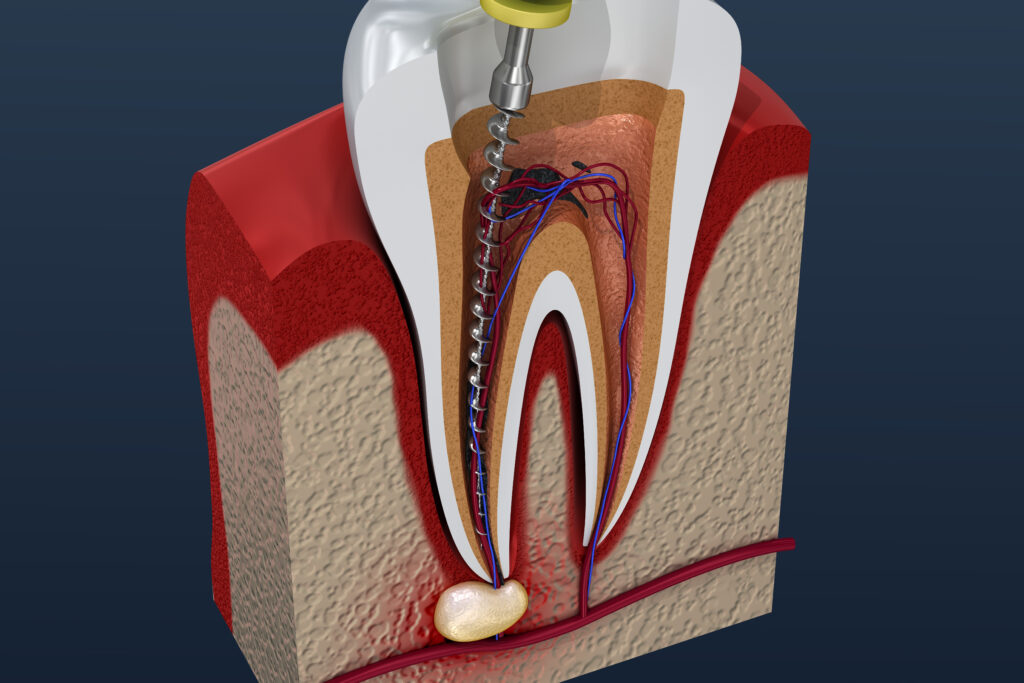(801) 212-9061
7555 Center View Ct Suite 104 West Jordan, UT 84084
Endodontic Surgery in West Jordan

Endodontic surgery, primarily known as root canal surgery, is a dental procedure that treats issues related to the soft pulp tissue inside the tooth. This form of surgery is often necessary when conventional root canal treatment can’t resolve the infection or inflammation in the tooth’s pulp. Endodontic surgery can save teeth that might otherwise need extraction.
If you believe you may benefit from endodontic surgery, contact us today at (801) 212-9061.
Endodontic Surgery: Process, Types, and Recovery
When is Endodontic Surgery Needed?
- Persistent Infections: Even after root canal therapy, infections can persist due to complex root structures or hidden canals that weren’t detected during initial treatment.
- Diagnosis of Dental Pains: Endodontic surgery helps in diagnosing tooth pains when non-surgical methods don’t provide results.
- Treatment of Root Surface or Bone Issues: Conditions affecting the root surface or surrounding bone, not addressed through traditional treatment, may require surgical intervention.
Common Types of Endodontic Surgery
- Apicoectomy (Root-End Resection): The most common endodontic surgery, which involves the removal of the tooth’s root tip and the surrounding infected tissue. A filling is then placed to seal the end of the root canal.
- Root Canal Re-treatment: If infection recurs after a root canal, this procedure involves reopening the tooth to access the root canal filling material, removing it, cleaning the canals, and refilling and sealing the tooth.
- Root Repair or Removal: Sometimes, a surgery may involve repairing or removing parts of the root that are cracked, damaged, or decayed.
The Surgical Procedure
- Preparation: Includes X-rays or a CT scan to assess the extent of the problem. Local anesthesia is used to numb the area.
- Surgical Process: The procedure typically involves making a small incision in the gum tissue to expose the underlying bone and remove any infected or inflamed tissue. The end of the root may also be removed, and a small filling is often placed to seal the root canal.
- Recovery and Aftercare: Post-surgery care is crucial for successful healing. Patients are advised on oral hygiene, medications for pain and infection control, and follow-up appointments for monitoring recovery.

Common Misconceptions about Endodontic Surgery
Misconception: Endodontic Surgery is Extremely Painful
Fact: With modern medicine and techniques, endodontic surgery is typically no more painful than getting a filling.
Misconception: Endodontic Surgery is a Last Resort and Rarely Successful
Fact: Endodontic surgery is a routine procedure with a high success rate, often used to save teeth that would otherwise need to be extracted.
Misconception: Recovery from Endodontic Surgery is Long and Complicated
Fact: Most patients recover quickly, with minimal post-operative discomfort, and can return to their normal activities within a few days.
Endodontic surgery plays a pivotal role in dental health, offering a specialized solution to save natural teeth and maintain oral health.
If you are experiencing tooth pain or have been told you might need a tooth removed call us at (801) 212-9061. Our skilled team is ready to provide the highest level of endodontic care to preserve your natural smile.
Frequently Asked Questions
Endodontic surgery, often referred to as apicoectomy, is a specialized dental procedure used to treat issues within the tooth’s root or surrounding bone that cannot be resolved with traditional root canal therapy. This surgery is usually required when inflammation or infection persists in the bony area around the end of your tooth after a root canal procedure. It’s also used to remove calcium deposits in root canals or to treat damaged root surfaces or surrounding bone.
Endodontic surgery involves making an incision in the gum tissue near the tooth to uncover the underlying bone and the root end of the tooth. The infected or inflamed tissue is removed along with the last few millimeters of the root tip. A small filling may then be placed in the root to seal the end of the root canal, and a few stitches are placed in the gum to help the tissue heal properly.
Endodontic surgery is typically performed under local anesthesia, making the procedure comfortable and pain-free. Post-surgical discomfort is generally mild and manageable with over-the-counter pain medications. Most patients return to their normal activities within a few days.
The primary benefit of endodontic surgery is the preservation of the natural tooth, which can help maintain proper chewing function, prevent other teeth from shifting, and preserve your natural appearance. It’s an excellent option for saving a tooth that might otherwise need to be extracted.
Recovery from endodontic surgery usually takes a few days, and most patients can return to their regular activities quickly. Complete healing of the bone can take a few months, but you can usually resume normal dental routines the day after surgery.
As with any surgical procedure, there are some risks involved, but they are minimal. Possible risks include infection, damage to nearby nerves, or sinus problems if the surgical area is close to sinus passages. Our endodontist will discuss these potential risks with you before the procedure.
Endodontic surgery has a high success rate. The procedure is effective in saving teeth that would otherwise need to be extracted. Success rates vary depending on the specific condition being treated and the overall health of the affected tooth.
It depends on the condition of your existing crown. If the crown and the tooth structure beneath it are sound, the existing crown may be able to be used. However, if the crown or tooth structure is damaged during the surgery, a new crown will be needed.
After the surgery, it’s important to follow our endodontist’s instructions for care. This typically includes taking prescribed medications, maintaining good oral hygiene, and avoiding chewing on the affected side until the area has healed.
The main alternative to endodontic surgery is tooth extraction. However, saving the natural tooth is usually the preferred option due to the long-term benefits for oral health. If extraction is the only option, it can be followed by an implant or bridge to replace the lost tooth.
BOOKING HOURS
M 8AM–5PM | Tu 8AM–5PM | Wed 7AM–6PM | Th 8AM–5PM | Fr 8AM–5PM
We are OPEN for ALL dental care procedures and emergency needs. Protecting the health and safety of our patients, families, and team members remains our number one priority.
Free $50 Gift Card*
$50 Gift Card when you complete an appointment with us!
*Redeemable after completed paid treatment. Must be a new patient to our organization and must not have been seen in ANY OF OUR LOCATIONS. The patient will receive a gift card via email or SMS after completion of their appt.
Free Exam & X-ray^
For New Patients without insurance we offer Free Exam and X-rays!
^For New Patients that do not have dental insurance. New patients must be 18 or older to receive free exam and x-rays. Discounts cannot be combined with other offers or dental discount plans. Additional fees may be included in individual cases.
$99 Hygiene Visit^^
For New Patients without insurance we offer Free Exam and X-rays!
^^For new patients without dental insurance. Includes Exam, X-Ray and Routine Cleaning. A Periodontal Cleaning requires additional fees, and rescheduled for further treatment. Cannot be combined with other offers or dental discount plans.

